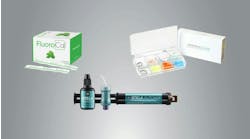Interview with Dr. Samson Liu
by Joe Blaes, DDS, Editor
Currently, more than 47 million people have difficulty accessing dental care in their communities. Because of this, a number of dentists from around the country have teamed up to form Dentists for Oral Health Innovation, or DOHI.
Recently, we spoke with DOHI president, Dr. Samson Liu, to discuss this newly formed coalition and its focus of expanding patient access to high-quality, cost-effective dental care.
DE: What is DOHI, and what goal do you seek to accomplish in the dental community?
Dr. Liu: Formed by many dentists from across the country, the DOHI coalition was created specifically to expand access to affordable, quality dental care for patients by using advancing models and methods. Examples of these models and methods include engaging others with progressive systems to handle aspects related to human resources, marketing, legal matters, and insurance processing, among others.
These resources enable dentists to not only meet the paperwork requirements of patients, but allow them to devote more time to patient care. By focusing on clinical services rather than business and administrative tasks, dentists increase patients' and communities' access to the oral health care they need. This coalition believes staying knowledgeable on the latest dental techniques and technologies is a priority. We are committed to expanding patient access to innovations such as digital X-rays, electronic health records, and CAD/CAM systems.
DE: How is DOHI structured, and who are its members?
Dr. Liu: DOHI is guided by a board of directors comprised of leading dentists across the country, including Executive Director Edward H. Meckler, DMD, and myself. Our organization represents thousands of dentists nationwide and welcomes dentists committed to providing affordable, quality dental care. Members include solo practitioners, dentists operating in group practices, and dentists who affiliate with dental support organizations (DSOs) for administrative support services.
DOHI members are committed to serving the communities where they live and work because they know healthier mouths lead to healthier communities. Members encourage their colleagues to advocate against market restrictions that hinder access to quality care, as well as encourage one another to work with dental plans and financing companies to increase access to care.
DE:What activities and initiatives is DOHI involved with?
Dr. Liu: We actively give back to our communities at home, across the country, and around the world. Members are passionate about initiatives that promote dental health, deliver free treatment services, provide oral health knowledge, and improve standards of living. DOHI members are actively engaged in numerous charitable initiatives that are achieving fundamental improvement in the health and lives of communities at home and around the world.
DE:DOHI seeks to resolve the current "dental divide" in the United States. What barriers contribute to this divide?
Dr. Liu: Currently, America faces a serious dental access shortage. According to the U.S. Department of Health and Human Services Health Resources and Services Administration, some states have just 65 dentists per 100,000 people -- fewer than the number of physicians for that same population. Geographically, it is estimated that 46.7 million Americans live in the nation's 4,438 dental Health Professional Shortage Areas (HPSAs). America needs nearly 7,000 dentists to eliminate this shortage, but even then, the target population-to-practitioner ratio would be short some 2,000 practitioners.
Financial barriers also exist. As many as 130 million Americans currently live without dental insurance coverage. According to a report by the Institute of Medicine, patients who do not have dental insurance are approximately two-thirds less likely to have visited their dentist within the past year, compared with those who have dental insurance coverage.
Lack of education and knowledge about proper oral health care is another obstacle. Many Americans do not understand the integral role oral health plays in general health, and mistakenly believe that dental care is only needed if they're in pain. Also, many adults seek dental pain treatment at an emergency room instead of a dental office. For those who have visited an emergency room, only a small percent said their needs were met.
DOHI seeks to address these barriers by focusing on three key commitments. These include patient care, continuing education and technology, and philanthropy.
President of Dentists for Oral Health Innovation, Samson Liu, DDS, MAGD, MBA, is also a practicing dentist at MyWildwoodDentist.com in Wildwood, Mo. Dr. Liu is also vice president of clinical affairs at Heartland Dental Care. For more information on DOHI, please visit www.oralhealthinnovation.org.
Past DE Issues







